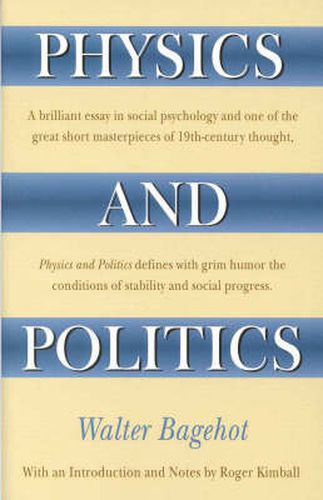Readings Newsletter
Become a Readings Member to make your shopping experience even easier.
Sign in or sign up for free!
You’re not far away from qualifying for FREE standard shipping within Australia
You’ve qualified for FREE standard shipping within Australia
The cart is loading…






One of the great short masterpieces of nineteenth-century thought, Physics and Politics is in essence a brilliant essay in social psychology. It defines with grim humor the conditions of stability and social progress. Physics in Bagehot’s book, refers to natural science; politics to social science. His vastly stimulating analysis was the first important effort to comprehend the implications of the new science (especially Darwinism) for the study of political affairs. In the process, Bagehot makes unforgettably clear the complex, often tragic relation between individual and collective happiness. Roger Kimball’s introduction and notes place Bagehot’s ideas in perspective for today’s reader and evaluate the continuing usefulness of his observations. We go to Bagehot for something that seems very difficult to convey accurately through mere definition or single examples-the true character of political man. This character, in turn, is important to discover, because on it depends the possibility of leading a life above ‘physics,’ a life better than that of the jungle. -Jacques Barzun.
$9.00 standard shipping within Australia
FREE standard shipping within Australia for orders over $100.00
Express & International shipping calculated at checkout
One of the great short masterpieces of nineteenth-century thought, Physics and Politics is in essence a brilliant essay in social psychology. It defines with grim humor the conditions of stability and social progress. Physics in Bagehot’s book, refers to natural science; politics to social science. His vastly stimulating analysis was the first important effort to comprehend the implications of the new science (especially Darwinism) for the study of political affairs. In the process, Bagehot makes unforgettably clear the complex, often tragic relation between individual and collective happiness. Roger Kimball’s introduction and notes place Bagehot’s ideas in perspective for today’s reader and evaluate the continuing usefulness of his observations. We go to Bagehot for something that seems very difficult to convey accurately through mere definition or single examples-the true character of political man. This character, in turn, is important to discover, because on it depends the possibility of leading a life above ‘physics,’ a life better than that of the jungle. -Jacques Barzun.